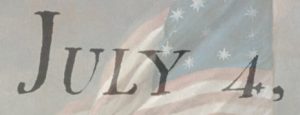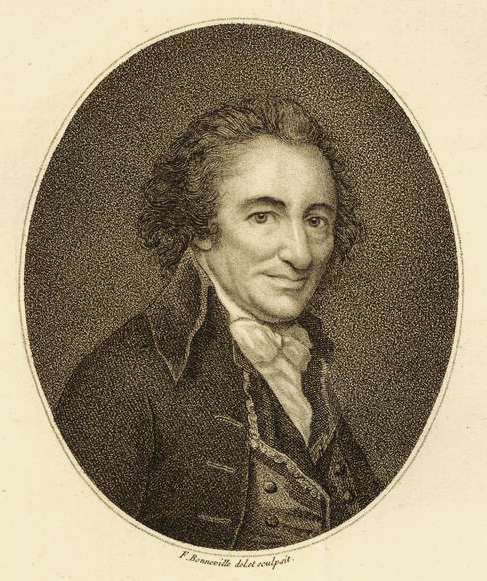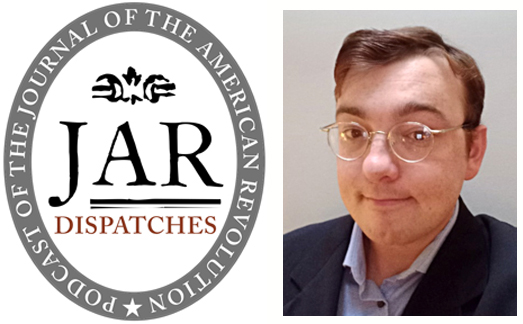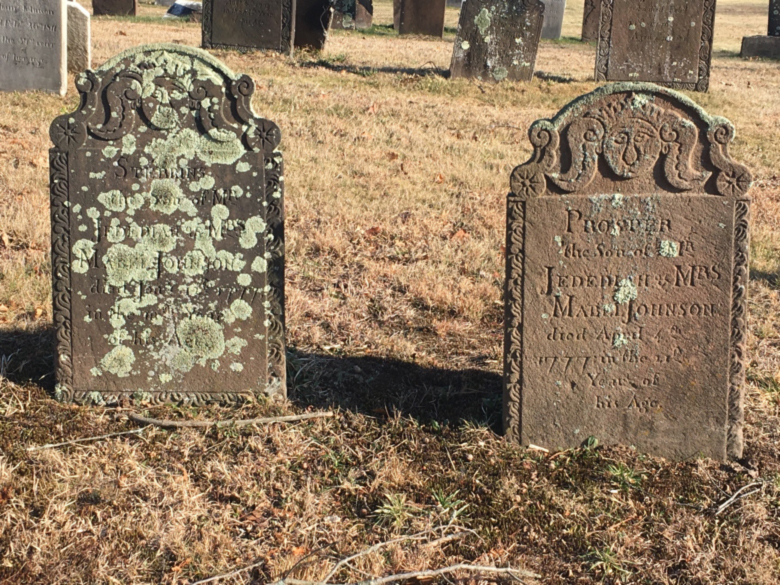“The day will be most memorable in the history of America. I am apt to believe that it will be celebrated by succeeding generations as the great anniversary festival. It ought to be solemnized with pomp and parade, bonfires, and illuminations from one end of this continent to the other, from this time forward forever more.”
So wrote John Adams on July 3, 1776, to Abigail, after the Continental Congress decided to proclaim the American colonies independent of England. The real events of that day were indeed momentous and changed the course of history. But the reality is that no fireworks went off on that day and no signing ceremony was held until almost a month later.
Many people today don’t think too much about the Declaration of Independence. The majority of people are not thinking about the list of grievances with King George, III that justified our breaking ties with the mother country. The 4th of July is a time for cookouts and fireworks. The British Empire was all-powerful. A group of colonies breaking away was an unprecedented event.[1]
But, if July 2 was the day that independence was formally declared and John Adams noted that July 2 would be remembered in American history and the Declaration was not actually signed until August 2, why celebrate Independence Day on July 4th?
On June 7, 1776, in what was to become known as the Lee Resolution, Richard Henry Lee of Virginia submitted Virginia’s proposal to the Second Continental Congress. Richard Henry Lee presented the resolution, which consisted of three parts and it was seconded by John Adams:
Resolved, That these United Colonies are, and of right ought to be, free and independent States, that they are absolved from all allegiance to the British Crown, and that all political connection between them and the State of Great Britain is, and ought to be, totally dissolved.
That it is expedient forthwith to take the most effectual measures for forming foreign Alliances.
That a plan of confederation be prepared and transmitted to the respective Colonies for their consideration and approbation
Congress then ordered a committee to be formed. This committee is known as “The Committee of Five” which consisted of John Adams, Roger Sherman, Benjamin Franklin, Robert Livingston and Thomas Jefferson. In 1823, Jefferson wrote that the other members of the committee “unanimously pressed on myself alone to undertake the draught (sic). I consented; I drew it; but not before I reported it to the committee I communicated it separately to Dr. Franklin and Mr. Adams requesting their corrections… I then wrote a fair copy, reported it to the committee, and from them, unaltered the Congress.” [2]
 After Adams and Franklin made their revisions, Jefferson’s declaration was submitted to Congress on June 28, 1776 and on July 4, 1776, the Second Continental Congress voted to approve the Declaration of Independence. The Declaration was pretty much our farewell letter to King George, III. The fifty six men who signed this document knew they were committing treason and could possibly be put to death, but this personifies what America stands for – that individuals have natural, inalienable rights.
After Adams and Franklin made their revisions, Jefferson’s declaration was submitted to Congress on June 28, 1776 and on July 4, 1776, the Second Continental Congress voted to approve the Declaration of Independence. The Declaration was pretty much our farewell letter to King George, III. The fifty six men who signed this document knew they were committing treason and could possibly be put to death, but this personifies what America stands for – that individuals have natural, inalienable rights.
Once independence had been adopted, Congress again formed itself into a Committee of the Whole. It then spent the better part of two days editing the draft submitted by its Committee of Five, rewriting or chopping off large sections of text.[3] Finally, the Declaration of Independence was formally declared on July 2, 1776, which Adams believed would be the “the most memorable Epocha in the history of America.” On July 4, 1776, Congress then approved the final text of the Declaration. The first public reading of the Declaration took place on July 8, 1776, in Philadelphia’s Independence Square and was not signed until August 2, 1776.[4]
The first official July 4th celebration was held on July 4, 1777, six years before Americans knew whether the new nation would even survive the war, and fireworks were a part of the festivities. This day was honored with firing of cannons, bonfires and setting off fireworks. Philadelphia was the first city to celebrate July 4th in this way and other cities and towns quickly took up the firing of guns and fireworks on July 4th as well. It was natural, then, that not only John Adams but also many of his countrymen should think of fireworks when independence was declared.
As reported in the July 5, 1777, Pennsylvania Evening Post (Philadelphia):
Yesterday the 4th of July, being the Anniversary of the Independence of the United States of America, was celebrated in this city with demonstrations of joy and festivity. About noon all the armed ships and gallies in the river were drawn up before the city, dressed in the gayest manner, with the colours of the United States and streamers displayed. At one o’clock, the yards being properly manned, they began the celebration of the day by a discharge of thirteen cannon from each of the ships, and one from each of the thirteen gallies, in honor of the Thirteen United States.
In the afternoon an elegant dinner was prepared for Congress, to which were invited the President and Supreme Executive Council, and Speaker of the Assembly of this state, the General Officers and Colonels of the army, and strangers of eminence, and the Members of the several Continental Boards in town. The Hessian band of music, taken in Trenton the 26th of December last, attended and heightened the festivity with some fine performances suited to the joyous occasion, while a corps of British deserters, taken into the service of the continent by the state of Georgia, being drawn up before the door, filled up the intervals with feux de joie. After dinner a number of toasts were drank, all breathing independence, and a generous love of liberty, and commemorating the memories of those brave and worthy patriots who gallantly exposed their lives, and fell gloriously in defence of freedom and the righteous cause of their country.
Each toast was followed by a discharge of artillery and small arms, and a suitable piece of music by the Hessian band.
The glorious fourth of July was reiterated three times, accompanied with triple discharges of cannon and small arms, and loud huzzas that resounded from street to street through the city. Towards evening several troops of horse, a corps of artillery, and a brigade of North-Carolina forces, which was in town on its way to join the grand army, were drawn up in Second-street, and reviewed by Congress and the General Officers. The evening was closed with the ringing of bells, and at night there was a grand exhibition of fireworks (which began and concluded with thirteen rockets) on the Commons, and the city was beautifully illuminated. Every thing was conducted with the greatest order and decorum, and the face of joy and gladness was universal.
Thus may the fourth of July, that glorious and ever memorable day, be celebrated through America, by the sons of freedom, from age to age till time shall be no more. Amen, and amen.
Nations come into being in many ways. Military rebellion, civil strife, acts of heroism, acts of treachery, a thousand greater and lesser clashes between defenders of the old order and supporters of the new. The birth of our own nation included them all. That birth was unique, not only in the immensity of its later impact on the course of world history and the growth of democracy, but also because so many of the threads in our national history run back through time to come together in one place, in one time and in one document: the Declaration of Independence was created to protect our rights.[5]
On this 4th of July, we ought to take time to think about our Declaration of Independence and reflect on each and every one of the courageous men who signed this document and who risked it all for liberty.













10 Comments
Citation [3] leads to a dead link.
When I submitted my article, the link was good. Here is the link:
http://www.america.gov/st/pubs-english/1997/August/20050606131757pssnikwad0.3779871.html
Thanks,
Pam
Thanks, Publius and Pam. The link has been fixed in the endnotes, too.
Thanks!
I very much enjoyed this article. It’s quite extraordinary how Americans were celebrating in 1777, before Saratoga, with little to encourage them. I guess even then Americans had a “can do” attitude that won the war, established the Constitution, and instilled this attitude in generations to come. I think it’s safe to say that most Americans don’t have ancestors who lived in the Colonies but what binds us is the sentiment and idealism that was conveyed in the final draft. Despite criticism to the contrary, we are constantly improving the lot of all. So with an eye to the past and another to the future, I hope this Journal continues to seek the truth which is always better than fiction.
Thank you, Steven,
You are so right. As much as I read on the American Revolution, I am still awed by their “can do” attitude.
Pam
As always, an informative and fascinating article!!!!!!!! Great job, Pam!!!!
Thank you, Lisa
Any excuse to enjoy libations – what an American tradition. S.P. Mark makes a wonderful point, that with so little actual achievement toward Independence there was still such celebration.
God Bless Americans and their celebrations. There is a story in Colonial Williamsburg of a group of men who were going to be pallbearers for a friend who had just died. On their way to his home, they stopped at every tavern they could to have a drink to celebrate their friend’s life. They arrived at the decedent’s home, had a few more drinks and then proceeded to the cemetery. They were half way to the grave site when they realized they had forgotten the deceased! You are so right, any excuse to enjoy libations.